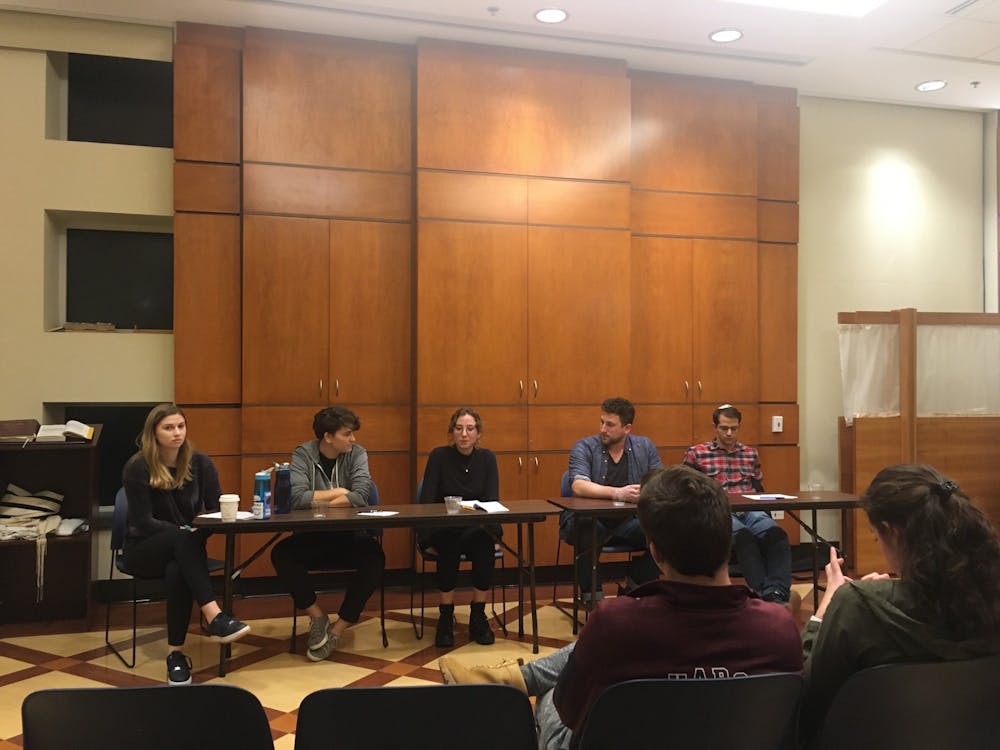The Hopkins chapter of J Street U — a pro-peace organization on college campuses advocating for a two-state solution to the Israel-Palestine conflict — hosted a panel discussion titled “Our Soldiers Break the Silence” on Wednesday. The panel was comprised of four American Jewish veterans of the Israeli Defense Forces (IDF): Becca Strober, Maya Eshel, Jacob Portman and Benzi Sanders.
Founded in 2004 by IDF veterans, Breaking the Silence (BtS) aims to expose the realities of serving in the occupied territories to the public. The organization hopes to expose the challenges the occupation creates for regular soldiers, and encourages others to be more critical of their support for Israel.
Sanders was an infantryman who served in the West Bank securing Israeli residential settlements. His job was to protect the Israeli settlers who lived in the settlements. What Sanders emphasized were the intimidation techniques he said the IDF used to achieve this goal.
“We had these armored vehicles, and at all times, in every little area, there was a vehicle with soldiers in full combat gear, and we’re driving around on the main roads,“ Sanders said.
Sanders explained that the purpose of this mission was to intimidate the Palestinians into complacency. He added that the IDF also employed checkpoints which were not really checking for anything in particular.
“We wanted to make the Israelis feel that we were protecting them, and we wanted to make the Palestinians feel like we’re there all the time,” Sanders said. “Anything that’s slightly out of the ordinary was suspicious.”
Portman shared his experiences with Palestinians while serving in the military.
Portman participated in Operation Brother’s Keeper in 2014 in Gaza to recover three kidnapped Israeli boys. He recalled a time when his platoon forcefully entered a Palestinian’s home. After determining that its occupants were not involved in the kidnappings, they used the house as a base to conduct searches on other homes to uncover information.
“Sometimes the searches were quick, and sometimes the searches were pretty destructive,” Portman said. “We went into one house that our commanders told us this guy is somehow related to the kidnappers, so we flipped the house. We pulled out every dresser, we tossed every piece of clothing on the floor, just made a huge mess and then left.”
Strober elaborated on the concept that every Palestinian civilian was viewed as capable of causing harm.
“If you’re uninvolved in terror, that means you’re not involved, but you’re a potential threat,” Strober said. “Innocent is not a word we use.”
Sanders highlighted the action-reaction dynamic that characterized the IDF’s efforts to secure areas for Israeli settlement.
He described a time when a road shared by Israelis and Palestinians was closed for exclusive Israeli access. Palestinians threw rocks at the IDF in retaliation, then were arrested by the military.
“That’s the kind of friction that’s created when you have a military force like us protecting our civilians in this area surrounded by people who we’re not supposed to protect,” Sanders said. “People don’t really want to hear about that or talk about it, they want to talk about Israel and security threats — this isn’t a security threat, it’s a security threat we’re creating.”
In an interview with The News-Letter, Bentley Addison, co-chair of J Street U at Hopkins, described how the conversations BtS encourages are important and necessary.
“No matter what our individual political beliefs are, we have to stop and think about what we’re lending our support to,” he said. “BtS is one of those groups that enables us to understand the situation even if we’re uncomfortable — leaning into that discomfort, leaning into things that might distress our political views or feel a little bit strange in order to realize that this is a real crisis.”
Sophomore Amanda Yuen believes that personal testimonies like the ones presented by the panelists are effective in bringing the issue to light.
“Personal testimony and storytelling is a really important way for me to bring voice to issues that are going on on the ground via the people who are witnessing them,” Yuen said. “It’s really great that they’re giving voice to a conflict, and specifically a side of the conflict that is unique and that they’re bringing to the U.S.”





